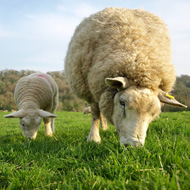BTV: clarity needed over vaccine price

NFU is also encouraging farmers to speak to their vet urgently about the risk of bluetongue to their individual flock.
Farmers are being urged to speak to their vets as a matter of urgency, after last week's announcement that a bluetongue vaccine will be available from mid-July.
Government estimates suggest there is an 80 per cent chance that bluetongue will reach the UK in late summer this year, as a result of infected midges being blown across from France.
There were initial concerns that a vaccine would not be available in time to prevent the disease taking hold, but MSD Animal Health and Zoetis announced on Friday (3 June) that batches of vaccine will become available in the UK next month.
Veterinary organisations welcomed the news but are seeking clarification on the cost and the amount of vaccine that will be available. BVA president Sean Wensley commented: "It would be helpful to have these questions clarified as soon as possible."
Charles Sercombe, National Farmers Union (NFU) livestock chairman, urged manufacturers and vets to be clear about pricing and availability, both of which will be key factors in whether or not farmers decide to vaccinate.
NFU is also encouraging farmers to speak to their vet urgently about the risk of bluetongue to their individual flock. Mr Sercombe added: "These conversations should be ongoing because as the situation in France and mainland Europe changes the risk will change in the UK."
UK vets are also contributing to the Joint campaign Against Bluetongue (JAB), speaking at local information events and displaying posters and leaflets in practice to raise awareness among farmers of the risks, clinical signs and what actions to take.



 The Federation of Independent Veterinary Practices (FIVP) has announced a third season of its podcast, Practice Matters.
The Federation of Independent Veterinary Practices (FIVP) has announced a third season of its podcast, Practice Matters.